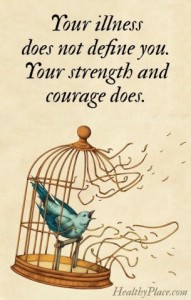
Since seizures had a name and epilepsy was a known diagnosis, stigmas were attached. Society often turns the other way when they see someone having a seizure. They cringe in disgust at the sight of convulsing, losing control of bodily functions but never think this person is fighting for their life in the midst of it. The world we live in, people never just stop to think about the other person. They don’t try to find the root of the situation or care to ask the why or the cause. But then you have us, the very rare percentage that will standup and say there’s more to this story. What would happen if people would actually try to learn more about someone else. Learn more about a medical condition, a culture, a way a life? A positive change would be made, I’m sure of it.
What exactly is a stigma? Webster defines a stigma as a set of negative and often unfair beliefs that a society or group of people have about something. I think that describes it perfectly. The stigmas placed on those living with epilepsy have been horrible over a number of decades. People with epilepsy were accused of being possessed, women were forbidden to have children in fear of “passing it on” to their fetus, and society believed if you had epilepsy you would be unable to function like “normal” people. Yes, those with epilepsy would not be able to succeed in life due to their condition. These are only a few. One public seizure and that’s just it for you, you are the outcast, put into a box and stigmatized. This is why it took so long for me to share the fact I actually had epilepsy.
If you were not in my immediate family or a very close family friend, you probably never knew I had epilepsy. You probably only found out in 2013 when my seizures surfaced again after 17 years. There’s a fear in sharing with others “hey, I have epilepsy”. You see on television the jokes being made, you see the movies of people foaming at the mouth falling into grand mal seizures, others kicking them or just leaving them for dead. Even worse, you have those living with epilepsy who lose family, friends, loved ones because THEY cannot handle it or are embarrassed. It makes you think twice about sharing. There’s a fear in being labeled incompetent. In many underdeveloped countries, those with epilepsy are denied jobs because of their condition. You are forced to make a choice, either say I have epilepsy and get denied on the spot or hide it, wish and hope you do not have a seizure and risk losing the job.
When I decided to speak out about my epilepsy, I also decided I wanted to live beyond the stigmas. I wanted the world to know I am not possessed, epilepsy is NOT contagious and I am functioning just like any other able-bodied person. I don’t like the term “normal” because um everybody has something crazy going on with them. Can’t deny that. I wanted anyone who is living with any illness, especially an invisible illness, to know that its okay to share. I say invisible because not all seizures involve convulsions. I can stand right in front of you and have a seizure and you would never know it. If you feel you are too afraid to speak up, then I will speak for you. No one should live in fear or be reduced by what society think is “okay”.
It’s outrageous the world we live in that something like a neurological disorder has to be hidden. Speaking up for yourself can ultimately save your life. Me personally, I did not ask for my brain to go haywire at 3 weeks old. It’s just the way the cookie crumbled. Not one time did I allow it to stop me from being me. I did not allow it to stop me from achieving everything I have achieved in life. It motivated me to strive to join the community and help others reach their full potential WITH epilepsy. I will not stop until everyone(around the world) is living beyond the stigmas.
